Peer to Peer-technolgies (P2P) enable Internet users to exchange files
between them without any middleman. Which sounds like a great proposition,
as you can now share your family photos, the first words of your child and
the first chapters of the book you're writing, with friends and relatives.
Unfortunately, these technologies can also be used for exchanging
copyrighted music files on a massive scale - and, ahem, they are. So the
anger of the music and film industry is somewhat understandable, as they
bring their case against programs such as StreamCastNetworks and Grokster
before the Supreme Court. The Software industry has always argued that their
products could not be banned, because they have legal functions as well.
Their argument can be compared to the use of a knife, which can serve for
both killing and cooking. A lower court has now found, however, that the
mentioned technologies had no "commercially significant" uses for
"legitimate purposes" and should therefore be banned. Compare this to
a handgranade - sure, you could use them to plow your garden, but you
wouldn't. The final verdict will therefore be all but certain, as both sides
have strong arguments in their favour.
Just as a background: The legal basis for the case is the 1984 Betamax-case, which saw Movie studios trying to ban Sony's video recorders, because they allegedly served to distribute illegal copies of movies. They failed and now the home video market is nearly three times larger than Hollywood's box office receipts.
Source: "Face the Music", The Economist April 2nd. pages 55/56
Homepage: The Economist
Further Reading:
1984 Betamax Case (Wikipedia)
Grokster Case (CNN)
Just as a background: The legal basis for the case is the 1984 Betamax-case, which saw Movie studios trying to ban Sony's video recorders, because they allegedly served to distribute illegal copies of movies. They failed and now the home video market is nearly three times larger than Hollywood's box office receipts.
Source: "Face the Music", The Economist April 2nd. pages 55/56
Homepage: The Economist
Further Reading:
1984 Betamax Case (Wikipedia)
Grokster Case (CNN)
 Facebook
Facebook 15 Questions
15 Questions



